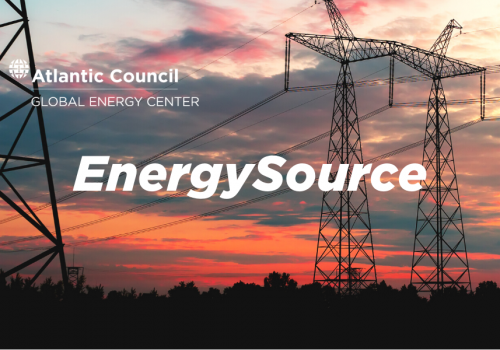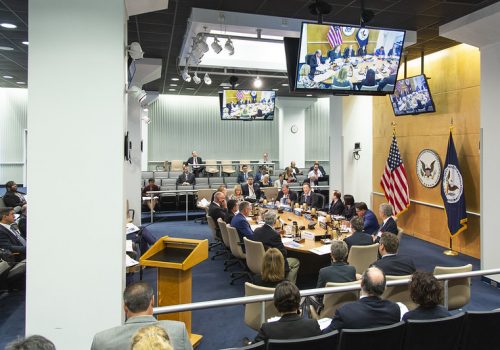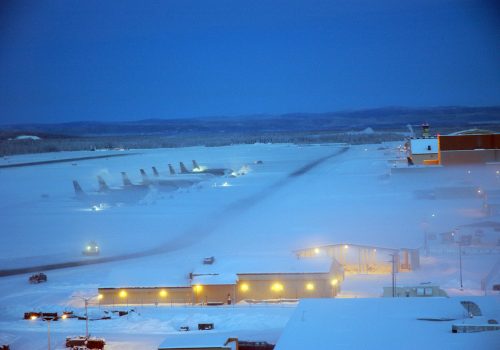
Joe Biden speaking with attendees at a 2019 fundraiser in Clear Lake, Iowa. (Gage Skidmore/Flickr/Wikimedia Creative Commons) ShareAlike 2.0 Generic License: https://creativecommons.org/licenses/by-sa/2.0/Original Image: https://www.flickr.com/photos/gageskidmore/48573410561/
With former Vice President Joe Biden now the President-elect of the United States, enthusiasm on the left is tempered by the likelihood that Republicans will keep the Senate. Climate policy is one of a few key areas in which Democrats hope to implement sweeping change by introducing federal policies to cut carbon emissions aggressively and invest significantly in infrastructure and technologies to speed decarbonization. However, while the full scope of Democratic policies may not be realized by the next Congress, legislation that encourages the rapid deployment of nuclear energy technology represents an area where Democrats and Republicans can continue to work together—as they have over the last four years—on advancing technologies with the potential to decarbonize power systems at home and abroad.
Although the United States formally withdrew from the Paris Agreement on November 4th, Biden has committed to rejoining the accord on the first day of his presidency, an action that he can accomplish with a stroke of the pen and without congressional approval. Under the Paris Agreement, the United States has pledged to reduce carbon emissions by 26 percent over 2005 levels, by 2025, but as of today, the United States is only on track to reduce emissions by 17 percent within that same timeframe. Federal policy will be crucial to making up the gap and putting the United States on a faster path to decarbonization; however, many policies that could aid decarbonization and require congressional approval (such as placing a price on carbon or renewing investment tax credits for renewable energy sources) may not make progress under a Republican-led Senate. However, nuclear energy—a low-carbon source of reliable power—has champions on both sides of the aisle and should receive attention from a Democratic administration looking to pass climate legislation.
With bipartisan support, Congress passed the Nuclear Energy Innovation Capabilities Act (NEICA), which was signed into law in 2018. Congress passed the Nuclear Energy Innovation and Modernization Act (NEIMA) in December 2018, and it was signed into law in 2019. NEICA helps establish public-private partnerships through the US Department of Energy’s Gateway for Accelerated Innovation in Nuclear (GAIN) program in order to speed the development of the next generation of nuclear reactors. Although advanced reactors are unlikely to be commercialized by 2025, their success can make a difference for US and global climate targets within the next decade. Similarly, NEIMA—which modernizes the regulatory process for nuclear reactors—was introduced by Senator John Barrasso (R-WY) and co-sponsored by ten Republican and eight Democratic senators.
Strong bipartisan congressional support for nuclear reactors—both the existing fleet and also the next generation of advanced reactors—is in line with the emphasis in Biden’s climate and energy plans on the importance of the domestic nuclear fleet as a source of low-carbon energy as well as the next generation of nuclear energy technologies. The current fleet—which accounts for 20 percent of total US electricity generation and more than half of low-carbon electricity generation in the United States—is integral to limiting carbon emissions, while commercializing and exporting advanced nuclear reactors is critical for US national security and global security and safeguards. As a statesman and national security expert, Biden should continue to support initiatives that will ensure that the United States can commercialize and export the next generation of nuclear technologies.
There are still more opportunities for bipartisan cooperation on nuclear energy policy. In July, the Nuclear Energy Leadership Act (NELA) waspassed in the Senate as an amendment to the National Defense Authorization Act for Fiscal Year 2021 with bipartisan support, but it was not included in the House version of the bill. Both chambers will have to agree on a final version of NELA before the new president can sign it into law. Support for NELA, which focuses on advanced reactor demonstration and developing advanced reactor fuel, would send a powerful signal from the Biden Administration. This also holds true for the Nuclear EnergyResearch and Development Act (NERDA), which was introduced in the House by Rep. Conor Lamb (D-PA-17) earlier this year.
The Biden Administration will need to identify energy policy areas that advance its climate policy goals and that are palatable on both sides of the aisle. Since congressional Republicans and Democrats have shown their support for a robust domestic reactor fleet and for a strong civil nuclear export program, nuclear energy offers an opportunity for Biden to pass bipartisan legislation while achieving his climate goals.
Jennifer T. Gordon is the managing editor and senior fellow for nuclear energy at that Atlantic Council Global Energy Center.
Read more from EnergySource
EnergySource provides analysis and insight on key energy issues, making sense of key energy trends and their implications for geopolitics, geoeconomics, policy, and markets.
Read MoreRead more from this author
Wed, Oct 7, 2020
Strengthening cooperation with allies could help the United States lead in exporting carbon-free nuclear energy
Driven in part by concerns over climate change, nuclear energy is receiving renewed attention. In order for the United States to meet growing international demand for nuclear reactors—rather than ceding the mantle of global exports to Russia and China—the United States will need to increase coordination with its allies in commercializing advanced reactors and streamlining relevant interagency processes.
EnergySourcebyMatt Bowen, Jennifer T. Gordon, Jackie Kempfer
Mon, Sep 14, 2020
Innovation in Nuclear Energy Technologies: Implications for US National Defense
The US Department of Defense (DOD) has the potential to play a significant role bringing advanced reactor technology to demonstration and, ultimately, commercialization. Possible US military applications of advanced reactors—especially micro nuclear reactors (MNRs)—include deployment to remote bases that are challenging to supply with fuel; power systems for directed-energy weapons; and nuclear energy systems for space flight and off-world bases. This issue brief explores the challenges and opportunities inherent in DOD’s procurement of MNRs.
In-Depth Research & ReportsbyDr. Robert F. Ichord, Jr. and Dr. Jennifer T. Gordon
Thu, Jan 9, 2020
International co-financing of nuclear reactors between the United States and its allies
The United States and its allies in civil nuclear cooperation have struggled in recent years to compete against state-owned nuclear enterprise exports. Since nuclear energy agreements establish decades’ long relationships between the vendor and purchasing countries, and the United States and its allies wish to export their high safety and nonproliferation standards along with technologies, it is vital that the United States regains its position of global leadership on nuclear energy exports. As Russia and China seek out third-party countries with demand for nuclear energy, can the United States and its allies determine how to cooperate on co-financing agreements and become greater than the sum of their parts?
Issue BriefbyJennifer T. Gordon
Follow us on social media
Subscribe to DirectCurrent
Sign up for the Global Energy Center newsletter to stay up to date on the program’s work.







